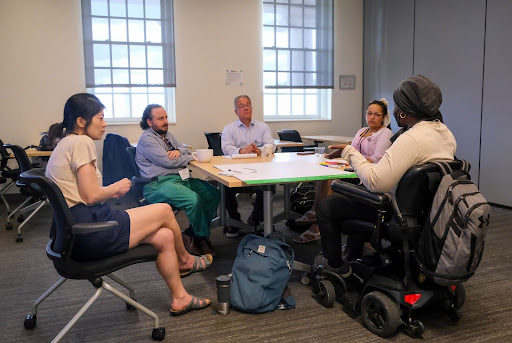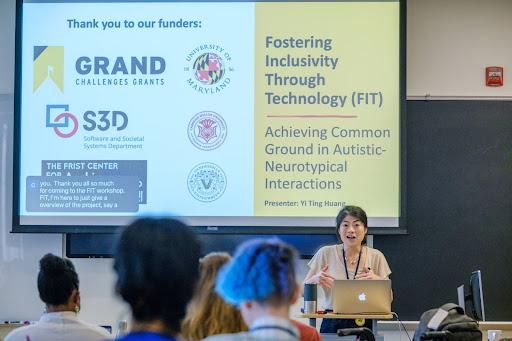UMD Faculty Co-Host Events Aimed at Increasing Neurodiversity
Events included a workshop on ways to promote mutual understanding between autistic and non-autistic people in the workplace, and the sixth annual Neurodiversity at Work Research Conference
University of Maryland researchers working on the Fostering Inclusivity through Technology (FIT) project recently hosted a workshop that brought autistic and non-autistic people together to discuss ways that workplaces could make it easier for everyone to communicate.
"FIT has captured people’s imagination for an augmented space for communication where everyone participates, understands, and technology helps close the gaps. This is a very ambitious goal, and we were excited by the range of perspectives and deep engagement that people brought to this challenge," said Department of Hearing and Speech Sciences (HESP) Associate Professor Yi Ting Huang, the grant’s Principal Investigator and the Director of Maryland Language Science Center (LSC).
Insights from the May 29 workshop added to those that the FIT team, which includes researchers from Carnegie Mellon University, had already gleaned. In the first phase of the project the researchers conducted more than 50 qualitative interviews with autistic professionals, autistic and non-autistic support professionals, and autistic and non-autistic business leaders to see what kind of communications challenges they find themselves facing. At the workshop, attendees brainstormed ways they thought technology could address those challenges, many mentioning video calling in particular—the end-product the FIT team had in mind.
Unprompted, the attendees also called for something the FIT team members were already planning to incorporate into the project’s final product: “universal design.”
“We're focused on helping autistic and non-autistic people communicate as a core challenge, but we don't want to design technology that's just to help autistic people, which would be like accommodating for a perceived deficit on the autistic person’s part,” explained Shevaun Lewis, a member of the FIT team, LSC assistant director, and director of the University of Maryland Autism Research Consortium (UMARC). “We want to create a technology where both autistic and non-autistic people have to contribute to the solution, and without us telling people to keep that in mind explicitly, all the designs we heard were tools that would help everyone communicate regardless of their neurotype.”

Some FIT workshop attendees, like Tracy Powell-Rudy—Vice President of Corporate Engagement for Integrate, a 501c3 whose mission is to help organizations identify, recruit and retain professionals on the autism spectrum—also attended the sixth annual Neurodiversity at Work Research Conference (NWRC) that Kathy Dow-Burger—FIT team member, HESP Clinical Professor and the Friedman Family Director of the Neurodiversity & Autism Transition Services program—hosted and co-organized with the University of Washington and Carnegie Mellon University the following two days, May 30-31.
“It was a pleasure and an honor to serve as a ‘discussant’ for the first-ever Fostering Inclusivity through Technology workshop,” said Powell-Rudy. “Providing critical remarks to facilitate discussion with the talented team of researchers across multiple disciplines, and the two universities, allows me as a parent, professional in this space, and (late-diagnosed) autistic woman to share a unique perspective.”
“As a dedicated member of the community committed to fostering neuroinclusive candidate experiences and work environments, I always eagerly anticipate the annual Neurodiversity at Work Research Conference,” she continued. “This event provides a unique opportunity to share research and collaborate with fellow researchers and practitioners, combining intellectual stimulation with an element of fun.”
BSOS Dean Susan M. Rivera, whose research focuses on investigating brain structure and function in both neurotypical and neurodivergent individuals, delivered opening remarks on the first day of the conference.
“As a researcher, as an administrator, as a parent to a student in college and a student in high school, I am proud to work with members of the neurodivergent community,” said Dean Rivera. “Our work and our interactions in society are all richer, more diverse, more inclusive and welcoming, and most importantly, smarter and more creative when we embrace and encourage neurodiversity not just in workplaces, but in all that we do.”
Like the FIT workshop, the NWRC was designed with neurodiversity in mind. The entire second floor of UMD’s Edward St. John Learning and Teaching Center was reserved for the conference so that people didn’t have to travel far for discussions, and so that guests had space to move around. There was also a devoted sensory room that was quiet, and that had low lighting and fidget devices, should individuals need a private space to recenter.
In keeping with one of this year’s conference themes, “the intersectionality of identities,” Allysa Ware, Executive Director of Family Voices—a national family-led organization of families and friends of children and youth with special health care needs (CYSHCN) and disabilities—delivered a keynote address on engaging the African American autism community in research.
To complement Dr. Ware’s keynote, an hour-long panel discussion followed, featuring neurodivergent people of color and other marginalized identities who shared their diverse insights and lived experiences. The NWRC also added a new “World Cafe” event where early career researchers were able to pitch and receive feedback on their research ideas.
Reflecting back on both events, Dow-Burger said: “It's very exciting to have been able to do this. Otherwise, we’re merely navel-gazing, stuck in silos trying to get research out rather than working as a broader, collaborative community to make a more lasting and powerful impact. The University of Maryland, through UMARC and BSOS, are doing just that.”
Learn more about the FIT Grand Challenges Grant Project
Published on Mon, Jun 17, 2024 - 3:23PM




